The Fantasy of Being Local: An Analysis of Airbnb's Impact
VerifiedAdded on 2022/10/07
|8
|1991
|57
Essay
AI Summary
This essay provides an in-depth analysis of Airbnb, focusing on its impact on the concept of local authenticity, the commodification of housing, and its role in the tourism industry. The paper explores how Airbnb, as a platform within the sharing economy, connects hosts and guests, promising authentic local experiences. It examines the different types of authenticity in tourism, including object-related, activity-related, and constructive authenticity, and how Airbnb leverages these to attract users. The essay discusses the implications of Airbnb's growth, including the potential for commodification of homes and the displacement of local residents, as well as the regulatory challenges it presents. The analysis also covers arguments surrounding the real disclosure of the concept of authenticity in tourism, and the potential for "Disneyfication." The essay concludes by suggesting regulations and legal practices to address the negative impacts of Airbnb while preserving its positive contributions to the sharing economy and tourism.
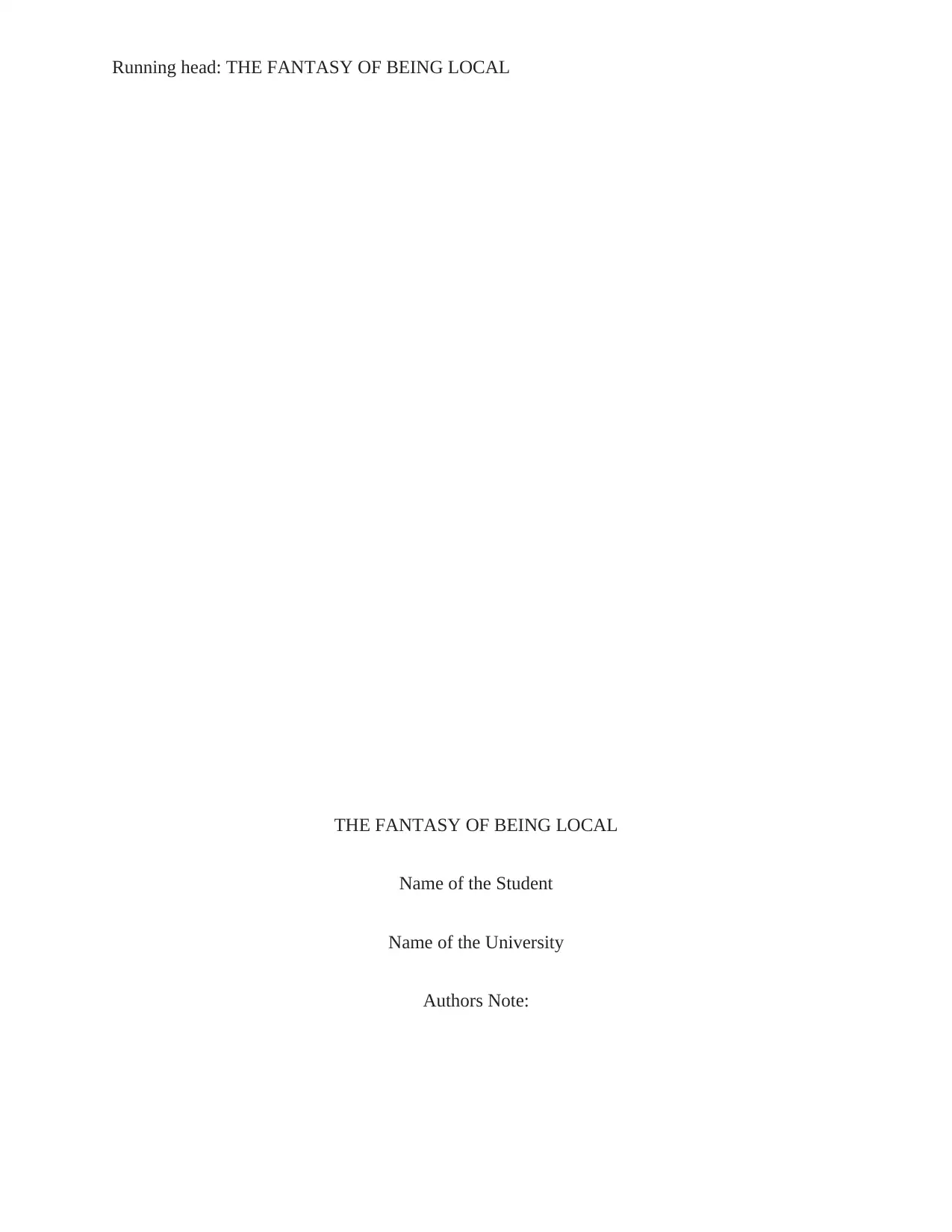
Running head: THE FANTASY OF BEING LOCAL
THE FANTASY OF BEING LOCAL
Name of the Student
Name of the University
Authors Note:
THE FANTASY OF BEING LOCAL
Name of the Student
Name of the University
Authors Note:
Paraphrase This Document
Need a fresh take? Get an instant paraphrase of this document with our AI Paraphraser
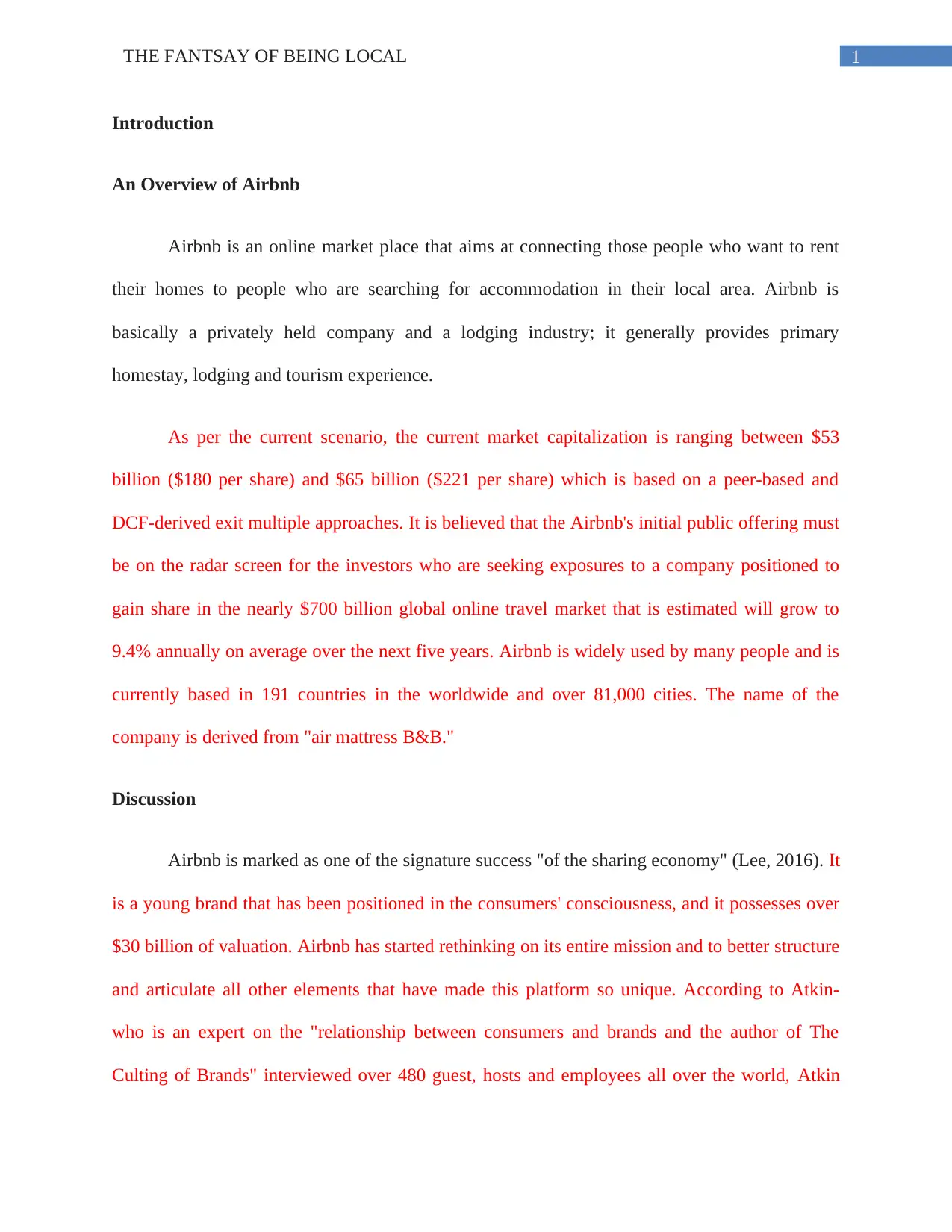
1THE FANTSAY OF BEING LOCAL
Introduction
An Overview of Airbnb
Airbnb is an online market place that aims at connecting those people who want to rent
their homes to people who are searching for accommodation in their local area. Airbnb is
basically a privately held company and a lodging industry; it generally provides primary
homestay, lodging and tourism experience.
As per the current scenario, the current market capitalization is ranging between $53
billion ($180 per share) and $65 billion ($221 per share) which is based on a peer-based and
DCF-derived exit multiple approaches. It is believed that the Airbnb's initial public offering must
be on the radar screen for the investors who are seeking exposures to a company positioned to
gain share in the nearly $700 billion global online travel market that is estimated will grow to
9.4% annually on average over the next five years. Airbnb is widely used by many people and is
currently based in 191 countries in the worldwide and over 81,000 cities. The name of the
company is derived from "air mattress B&B."
Discussion
Airbnb is marked as one of the signature success "of the sharing economy" (Lee, 2016). It
is a young brand that has been positioned in the consumers' consciousness, and it possesses over
$30 billion of valuation. Airbnb has started rethinking on its entire mission and to better structure
and articulate all other elements that have made this platform so unique. According to Atkin-
who is an expert on the "relationship between consumers and brands and the author of The
Culting of Brands" interviewed over 480 guest, hosts and employees all over the world, Atkin
Introduction
An Overview of Airbnb
Airbnb is an online market place that aims at connecting those people who want to rent
their homes to people who are searching for accommodation in their local area. Airbnb is
basically a privately held company and a lodging industry; it generally provides primary
homestay, lodging and tourism experience.
As per the current scenario, the current market capitalization is ranging between $53
billion ($180 per share) and $65 billion ($221 per share) which is based on a peer-based and
DCF-derived exit multiple approaches. It is believed that the Airbnb's initial public offering must
be on the radar screen for the investors who are seeking exposures to a company positioned to
gain share in the nearly $700 billion global online travel market that is estimated will grow to
9.4% annually on average over the next five years. Airbnb is widely used by many people and is
currently based in 191 countries in the worldwide and over 81,000 cities. The name of the
company is derived from "air mattress B&B."
Discussion
Airbnb is marked as one of the signature success "of the sharing economy" (Lee, 2016). It
is a young brand that has been positioned in the consumers' consciousness, and it possesses over
$30 billion of valuation. Airbnb has started rethinking on its entire mission and to better structure
and articulate all other elements that have made this platform so unique. According to Atkin-
who is an expert on the "relationship between consumers and brands and the author of The
Culting of Brands" interviewed over 480 guest, hosts and employees all over the world, Atkin
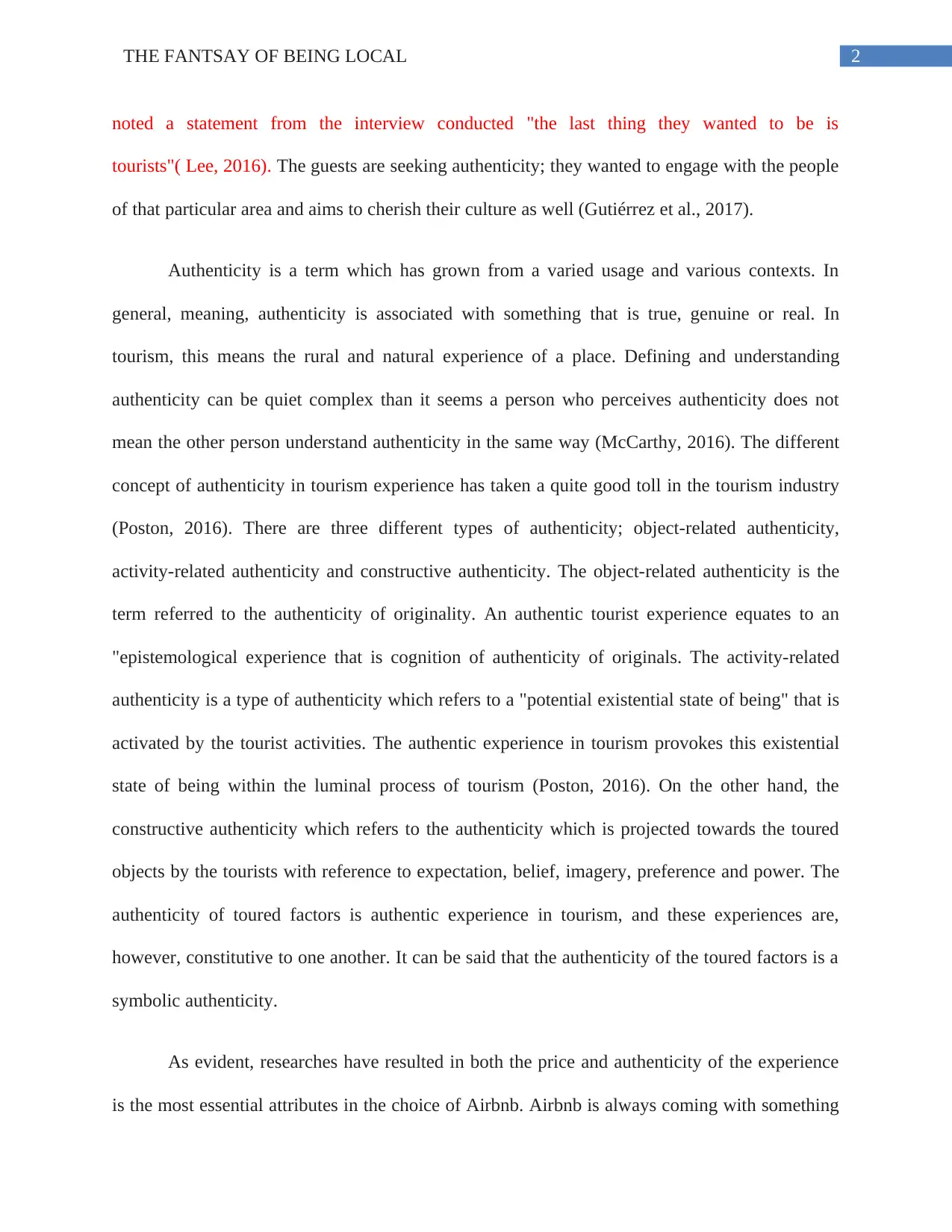
2THE FANTSAY OF BEING LOCAL
noted a statement from the interview conducted "the last thing they wanted to be is
tourists"( Lee, 2016). The guests are seeking authenticity; they wanted to engage with the people
of that particular area and aims to cherish their culture as well (Gutiérrez et al., 2017).
Authenticity is a term which has grown from a varied usage and various contexts. In
general, meaning, authenticity is associated with something that is true, genuine or real. In
tourism, this means the rural and natural experience of a place. Defining and understanding
authenticity can be quiet complex than it seems a person who perceives authenticity does not
mean the other person understand authenticity in the same way (McCarthy, 2016). The different
concept of authenticity in tourism experience has taken a quite good toll in the tourism industry
(Poston, 2016). There are three different types of authenticity; object-related authenticity,
activity-related authenticity and constructive authenticity. The object-related authenticity is the
term referred to the authenticity of originality. An authentic tourist experience equates to an
"epistemological experience that is cognition of authenticity of originals. The activity-related
authenticity is a type of authenticity which refers to a "potential existential state of being" that is
activated by the tourist activities. The authentic experience in tourism provokes this existential
state of being within the luminal process of tourism (Poston, 2016). On the other hand, the
constructive authenticity which refers to the authenticity which is projected towards the toured
objects by the tourists with reference to expectation, belief, imagery, preference and power. The
authenticity of toured factors is authentic experience in tourism, and these experiences are,
however, constitutive to one another. It can be said that the authenticity of the toured factors is a
symbolic authenticity.
As evident, researches have resulted in both the price and authenticity of the experience
is the most essential attributes in the choice of Airbnb. Airbnb is always coming with something
noted a statement from the interview conducted "the last thing they wanted to be is
tourists"( Lee, 2016). The guests are seeking authenticity; they wanted to engage with the people
of that particular area and aims to cherish their culture as well (Gutiérrez et al., 2017).
Authenticity is a term which has grown from a varied usage and various contexts. In
general, meaning, authenticity is associated with something that is true, genuine or real. In
tourism, this means the rural and natural experience of a place. Defining and understanding
authenticity can be quiet complex than it seems a person who perceives authenticity does not
mean the other person understand authenticity in the same way (McCarthy, 2016). The different
concept of authenticity in tourism experience has taken a quite good toll in the tourism industry
(Poston, 2016). There are three different types of authenticity; object-related authenticity,
activity-related authenticity and constructive authenticity. The object-related authenticity is the
term referred to the authenticity of originality. An authentic tourist experience equates to an
"epistemological experience that is cognition of authenticity of originals. The activity-related
authenticity is a type of authenticity which refers to a "potential existential state of being" that is
activated by the tourist activities. The authentic experience in tourism provokes this existential
state of being within the luminal process of tourism (Poston, 2016). On the other hand, the
constructive authenticity which refers to the authenticity which is projected towards the toured
objects by the tourists with reference to expectation, belief, imagery, preference and power. The
authenticity of toured factors is authentic experience in tourism, and these experiences are,
however, constitutive to one another. It can be said that the authenticity of the toured factors is a
symbolic authenticity.
As evident, researches have resulted in both the price and authenticity of the experience
is the most essential attributes in the choice of Airbnb. Airbnb is always coming with something
⊘ This is a preview!⊘
Do you want full access?
Subscribe today to unlock all pages.

Trusted by 1+ million students worldwide
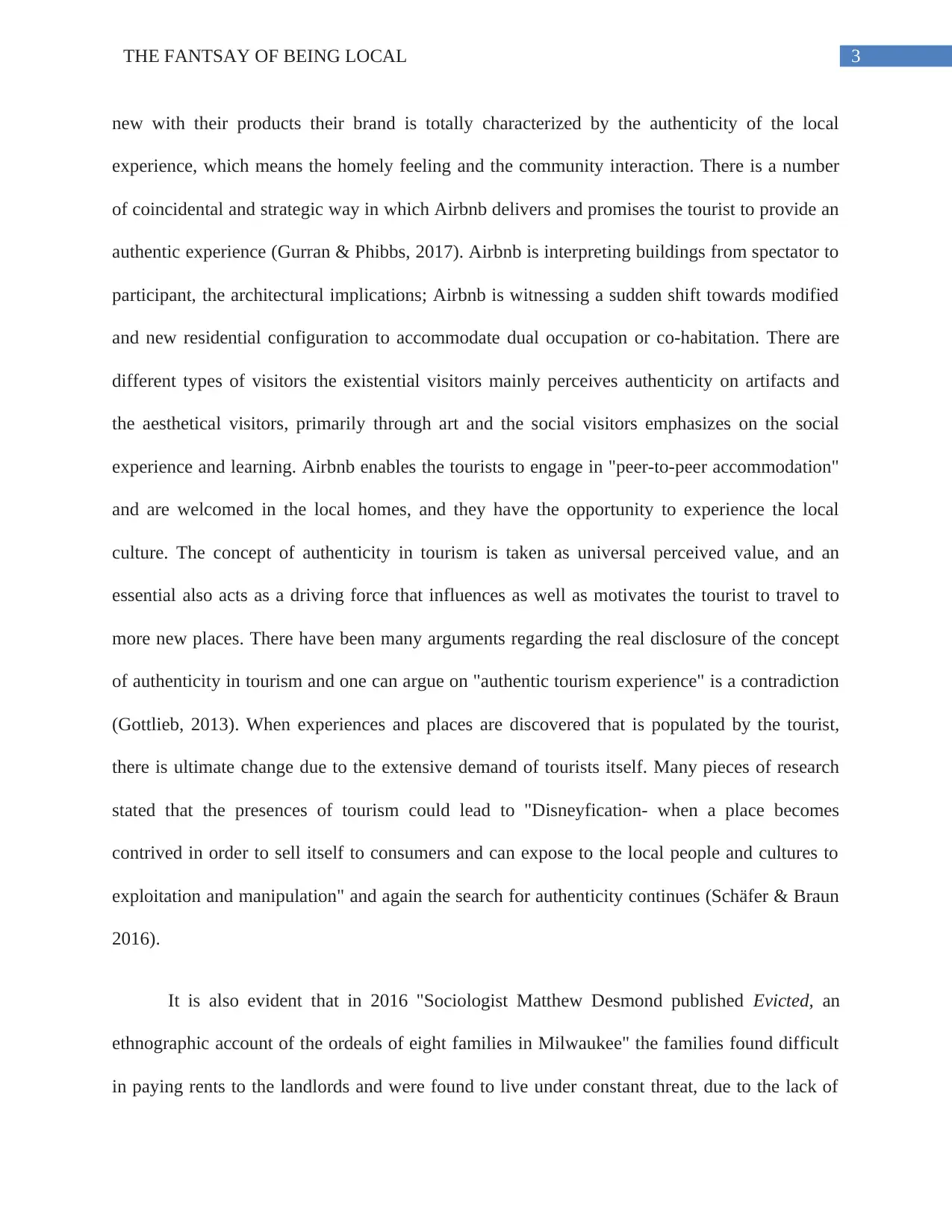
3THE FANTSAY OF BEING LOCAL
new with their products their brand is totally characterized by the authenticity of the local
experience, which means the homely feeling and the community interaction. There is a number
of coincidental and strategic way in which Airbnb delivers and promises the tourist to provide an
authentic experience (Gurran & Phibbs, 2017). Airbnb is interpreting buildings from spectator to
participant, the architectural implications; Airbnb is witnessing a sudden shift towards modified
and new residential configuration to accommodate dual occupation or co-habitation. There are
different types of visitors the existential visitors mainly perceives authenticity on artifacts and
the aesthetical visitors, primarily through art and the social visitors emphasizes on the social
experience and learning. Airbnb enables the tourists to engage in "peer-to-peer accommodation"
and are welcomed in the local homes, and they have the opportunity to experience the local
culture. The concept of authenticity in tourism is taken as universal perceived value, and an
essential also acts as a driving force that influences as well as motivates the tourist to travel to
more new places. There have been many arguments regarding the real disclosure of the concept
of authenticity in tourism and one can argue on "authentic tourism experience" is a contradiction
(Gottlieb, 2013). When experiences and places are discovered that is populated by the tourist,
there is ultimate change due to the extensive demand of tourists itself. Many pieces of research
stated that the presences of tourism could lead to "Disneyfication- when a place becomes
contrived in order to sell itself to consumers and can expose to the local people and cultures to
exploitation and manipulation" and again the search for authenticity continues (Schäfer & Braun
2016).
It is also evident that in 2016 "Sociologist Matthew Desmond published Evicted, an
ethnographic account of the ordeals of eight families in Milwaukee" the families found difficult
in paying rents to the landlords and were found to live under constant threat, due to the lack of
new with their products their brand is totally characterized by the authenticity of the local
experience, which means the homely feeling and the community interaction. There is a number
of coincidental and strategic way in which Airbnb delivers and promises the tourist to provide an
authentic experience (Gurran & Phibbs, 2017). Airbnb is interpreting buildings from spectator to
participant, the architectural implications; Airbnb is witnessing a sudden shift towards modified
and new residential configuration to accommodate dual occupation or co-habitation. There are
different types of visitors the existential visitors mainly perceives authenticity on artifacts and
the aesthetical visitors, primarily through art and the social visitors emphasizes on the social
experience and learning. Airbnb enables the tourists to engage in "peer-to-peer accommodation"
and are welcomed in the local homes, and they have the opportunity to experience the local
culture. The concept of authenticity in tourism is taken as universal perceived value, and an
essential also acts as a driving force that influences as well as motivates the tourist to travel to
more new places. There have been many arguments regarding the real disclosure of the concept
of authenticity in tourism and one can argue on "authentic tourism experience" is a contradiction
(Gottlieb, 2013). When experiences and places are discovered that is populated by the tourist,
there is ultimate change due to the extensive demand of tourists itself. Many pieces of research
stated that the presences of tourism could lead to "Disneyfication- when a place becomes
contrived in order to sell itself to consumers and can expose to the local people and cultures to
exploitation and manipulation" and again the search for authenticity continues (Schäfer & Braun
2016).
It is also evident that in 2016 "Sociologist Matthew Desmond published Evicted, an
ethnographic account of the ordeals of eight families in Milwaukee" the families found difficult
in paying rents to the landlords and were found to live under constant threat, due to the lack of
Paraphrase This Document
Need a fresh take? Get an instant paraphrase of this document with our AI Paraphraser
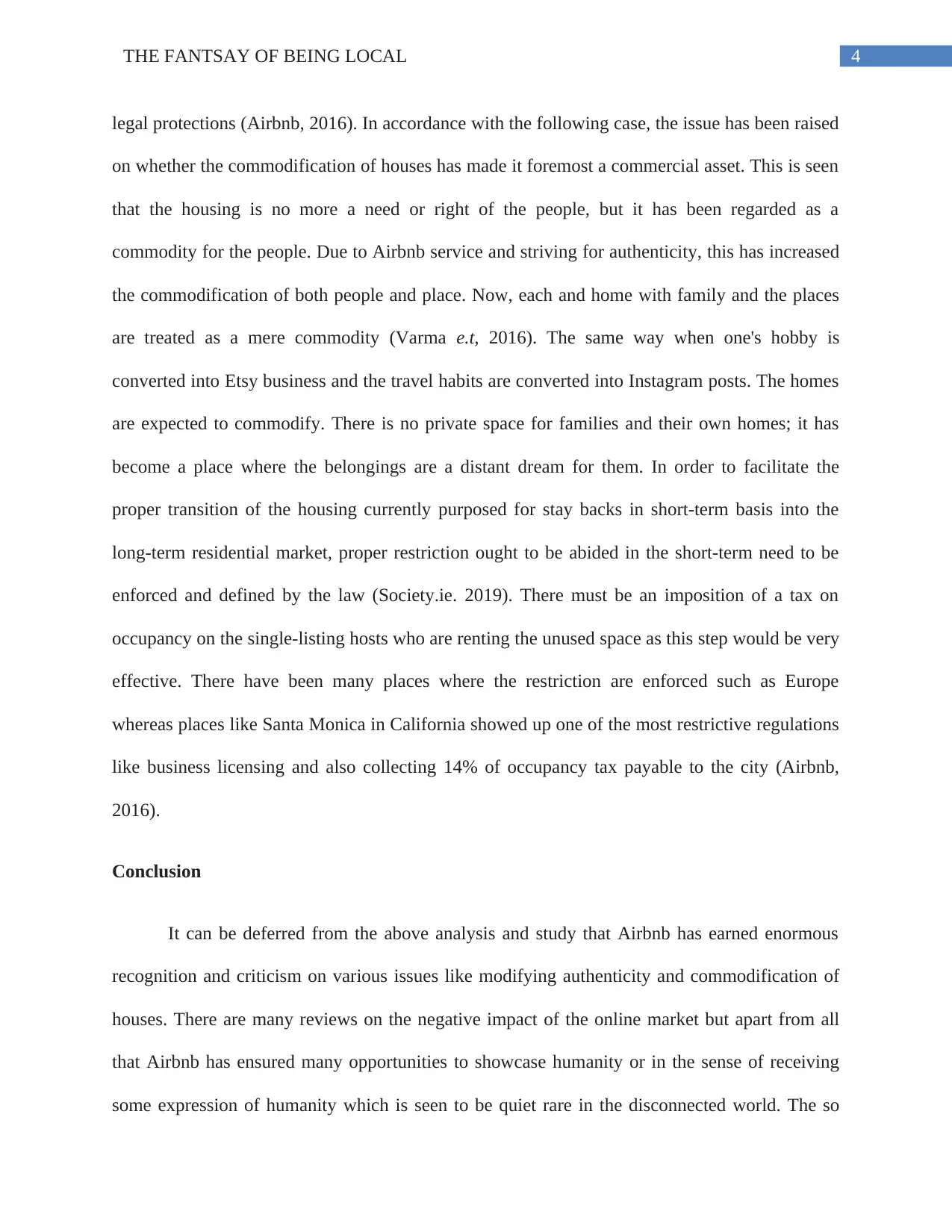
4THE FANTSAY OF BEING LOCAL
legal protections (Airbnb, 2016). In accordance with the following case, the issue has been raised
on whether the commodification of houses has made it foremost a commercial asset. This is seen
that the housing is no more a need or right of the people, but it has been regarded as a
commodity for the people. Due to Airbnb service and striving for authenticity, this has increased
the commodification of both people and place. Now, each and home with family and the places
are treated as a mere commodity (Varma e.t, 2016). The same way when one's hobby is
converted into Etsy business and the travel habits are converted into Instagram posts. The homes
are expected to commodify. There is no private space for families and their own homes; it has
become a place where the belongings are a distant dream for them. In order to facilitate the
proper transition of the housing currently purposed for stay backs in short-term basis into the
long-term residential market, proper restriction ought to be abided in the short-term need to be
enforced and defined by the law (Society.ie. 2019). There must be an imposition of a tax on
occupancy on the single-listing hosts who are renting the unused space as this step would be very
effective. There have been many places where the restriction are enforced such as Europe
whereas places like Santa Monica in California showed up one of the most restrictive regulations
like business licensing and also collecting 14% of occupancy tax payable to the city (Airbnb,
2016).
Conclusion
It can be deferred from the above analysis and study that Airbnb has earned enormous
recognition and criticism on various issues like modifying authenticity and commodification of
houses. There are many reviews on the negative impact of the online market but apart from all
that Airbnb has ensured many opportunities to showcase humanity or in the sense of receiving
some expression of humanity which is seen to be quiet rare in the disconnected world. The so
legal protections (Airbnb, 2016). In accordance with the following case, the issue has been raised
on whether the commodification of houses has made it foremost a commercial asset. This is seen
that the housing is no more a need or right of the people, but it has been regarded as a
commodity for the people. Due to Airbnb service and striving for authenticity, this has increased
the commodification of both people and place. Now, each and home with family and the places
are treated as a mere commodity (Varma e.t, 2016). The same way when one's hobby is
converted into Etsy business and the travel habits are converted into Instagram posts. The homes
are expected to commodify. There is no private space for families and their own homes; it has
become a place where the belongings are a distant dream for them. In order to facilitate the
proper transition of the housing currently purposed for stay backs in short-term basis into the
long-term residential market, proper restriction ought to be abided in the short-term need to be
enforced and defined by the law (Society.ie. 2019). There must be an imposition of a tax on
occupancy on the single-listing hosts who are renting the unused space as this step would be very
effective. There have been many places where the restriction are enforced such as Europe
whereas places like Santa Monica in California showed up one of the most restrictive regulations
like business licensing and also collecting 14% of occupancy tax payable to the city (Airbnb,
2016).
Conclusion
It can be deferred from the above analysis and study that Airbnb has earned enormous
recognition and criticism on various issues like modifying authenticity and commodification of
houses. There are many reviews on the negative impact of the online market but apart from all
that Airbnb has ensured many opportunities to showcase humanity or in the sense of receiving
some expression of humanity which is seen to be quiet rare in the disconnected world. The so
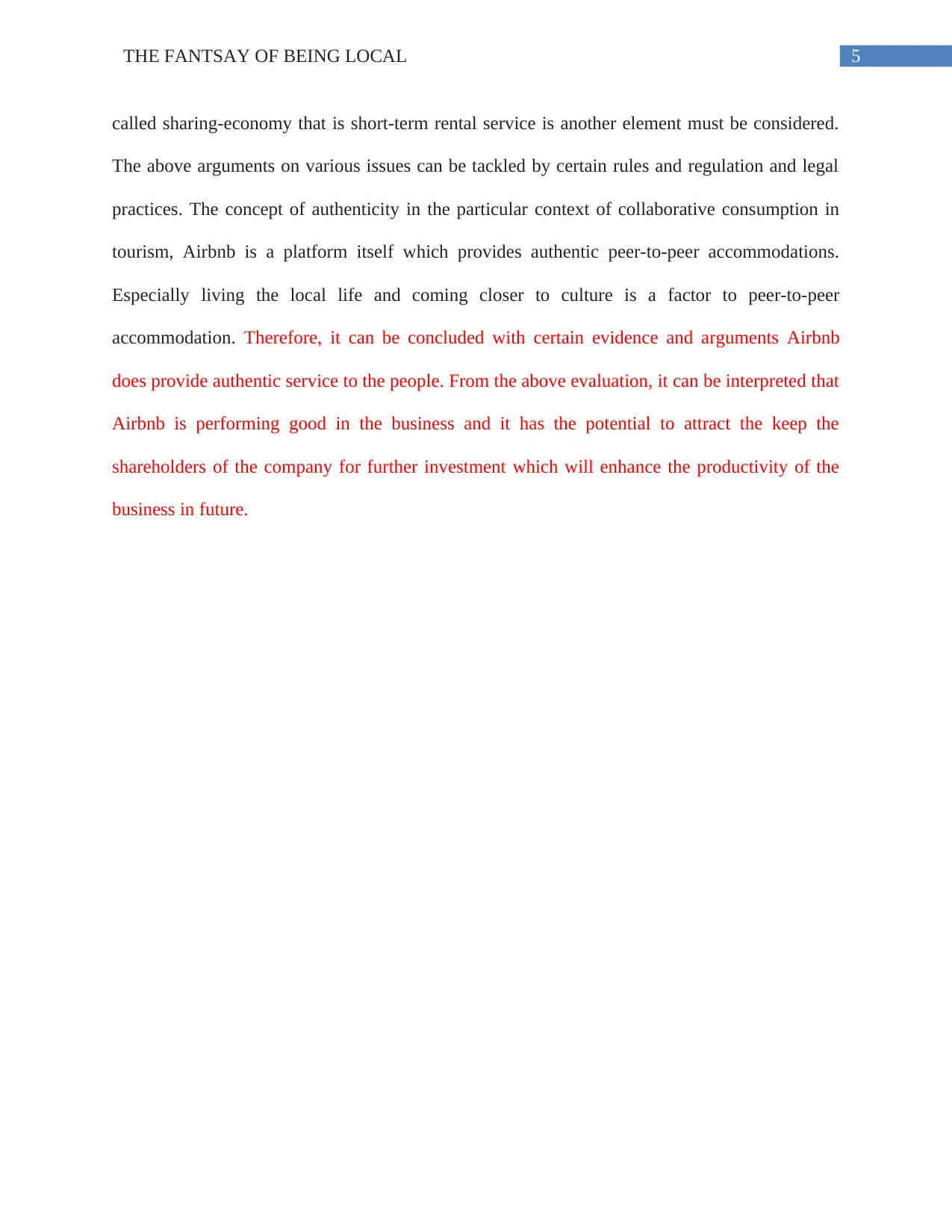
5THE FANTSAY OF BEING LOCAL
called sharing-economy that is short-term rental service is another element must be considered.
The above arguments on various issues can be tackled by certain rules and regulation and legal
practices. The concept of authenticity in the particular context of collaborative consumption in
tourism, Airbnb is a platform itself which provides authentic peer-to-peer accommodations.
Especially living the local life and coming closer to culture is a factor to peer-to-peer
accommodation. Therefore, it can be concluded with certain evidence and arguments Airbnb
does provide authentic service to the people. From the above evaluation, it can be interpreted that
Airbnb is performing good in the business and it has the potential to attract the keep the
shareholders of the company for further investment which will enhance the productivity of the
business in future.
called sharing-economy that is short-term rental service is another element must be considered.
The above arguments on various issues can be tackled by certain rules and regulation and legal
practices. The concept of authenticity in the particular context of collaborative consumption in
tourism, Airbnb is a platform itself which provides authentic peer-to-peer accommodations.
Especially living the local life and coming closer to culture is a factor to peer-to-peer
accommodation. Therefore, it can be concluded with certain evidence and arguments Airbnb
does provide authentic service to the people. From the above evaluation, it can be interpreted that
Airbnb is performing good in the business and it has the potential to attract the keep the
shareholders of the company for further investment which will enhance the productivity of the
business in future.
⊘ This is a preview!⊘
Do you want full access?
Subscribe today to unlock all pages.

Trusted by 1+ million students worldwide
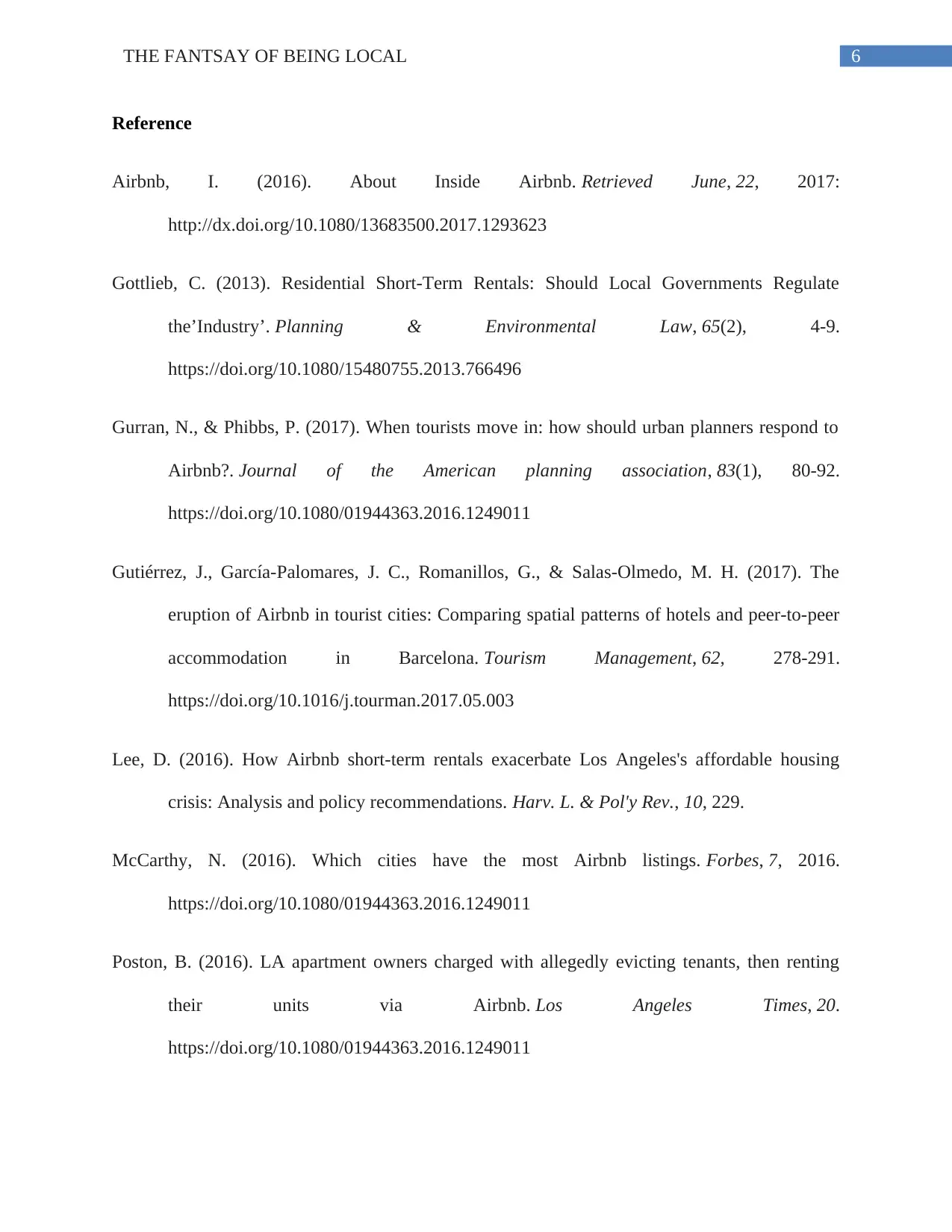
6THE FANTSAY OF BEING LOCAL
Reference
Airbnb, I. (2016). About Inside Airbnb. Retrieved June, 22, 2017:
http://dx.doi.org/10.1080/13683500.2017.1293623
Gottlieb, C. (2013). Residential Short-Term Rentals: Should Local Governments Regulate
the’Industry’. Planning & Environmental Law, 65(2), 4-9.
https://doi.org/10.1080/15480755.2013.766496
Gurran, N., & Phibbs, P. (2017). When tourists move in: how should urban planners respond to
Airbnb?. Journal of the American planning association, 83(1), 80-92.
https://doi.org/10.1080/01944363.2016.1249011
Gutiérrez, J., García-Palomares, J. C., Romanillos, G., & Salas-Olmedo, M. H. (2017). The
eruption of Airbnb in tourist cities: Comparing spatial patterns of hotels and peer-to-peer
accommodation in Barcelona. Tourism Management, 62, 278-291.
https://doi.org/10.1016/j.tourman.2017.05.003
Lee, D. (2016). How Airbnb short-term rentals exacerbate Los Angeles's affordable housing
crisis: Analysis and policy recommendations. Harv. L. & Pol'y Rev., 10, 229.
McCarthy, N. (2016). Which cities have the most Airbnb listings. Forbes, 7, 2016.
https://doi.org/10.1080/01944363.2016.1249011
Poston, B. (2016). LA apartment owners charged with allegedly evicting tenants, then renting
their units via Airbnb. Los Angeles Times, 20.
https://doi.org/10.1080/01944363.2016.1249011
Reference
Airbnb, I. (2016). About Inside Airbnb. Retrieved June, 22, 2017:
http://dx.doi.org/10.1080/13683500.2017.1293623
Gottlieb, C. (2013). Residential Short-Term Rentals: Should Local Governments Regulate
the’Industry’. Planning & Environmental Law, 65(2), 4-9.
https://doi.org/10.1080/15480755.2013.766496
Gurran, N., & Phibbs, P. (2017). When tourists move in: how should urban planners respond to
Airbnb?. Journal of the American planning association, 83(1), 80-92.
https://doi.org/10.1080/01944363.2016.1249011
Gutiérrez, J., García-Palomares, J. C., Romanillos, G., & Salas-Olmedo, M. H. (2017). The
eruption of Airbnb in tourist cities: Comparing spatial patterns of hotels and peer-to-peer
accommodation in Barcelona. Tourism Management, 62, 278-291.
https://doi.org/10.1016/j.tourman.2017.05.003
Lee, D. (2016). How Airbnb short-term rentals exacerbate Los Angeles's affordable housing
crisis: Analysis and policy recommendations. Harv. L. & Pol'y Rev., 10, 229.
McCarthy, N. (2016). Which cities have the most Airbnb listings. Forbes, 7, 2016.
https://doi.org/10.1080/01944363.2016.1249011
Poston, B. (2016). LA apartment owners charged with allegedly evicting tenants, then renting
their units via Airbnb. Los Angeles Times, 20.
https://doi.org/10.1080/01944363.2016.1249011
Paraphrase This Document
Need a fresh take? Get an instant paraphrase of this document with our AI Paraphraser
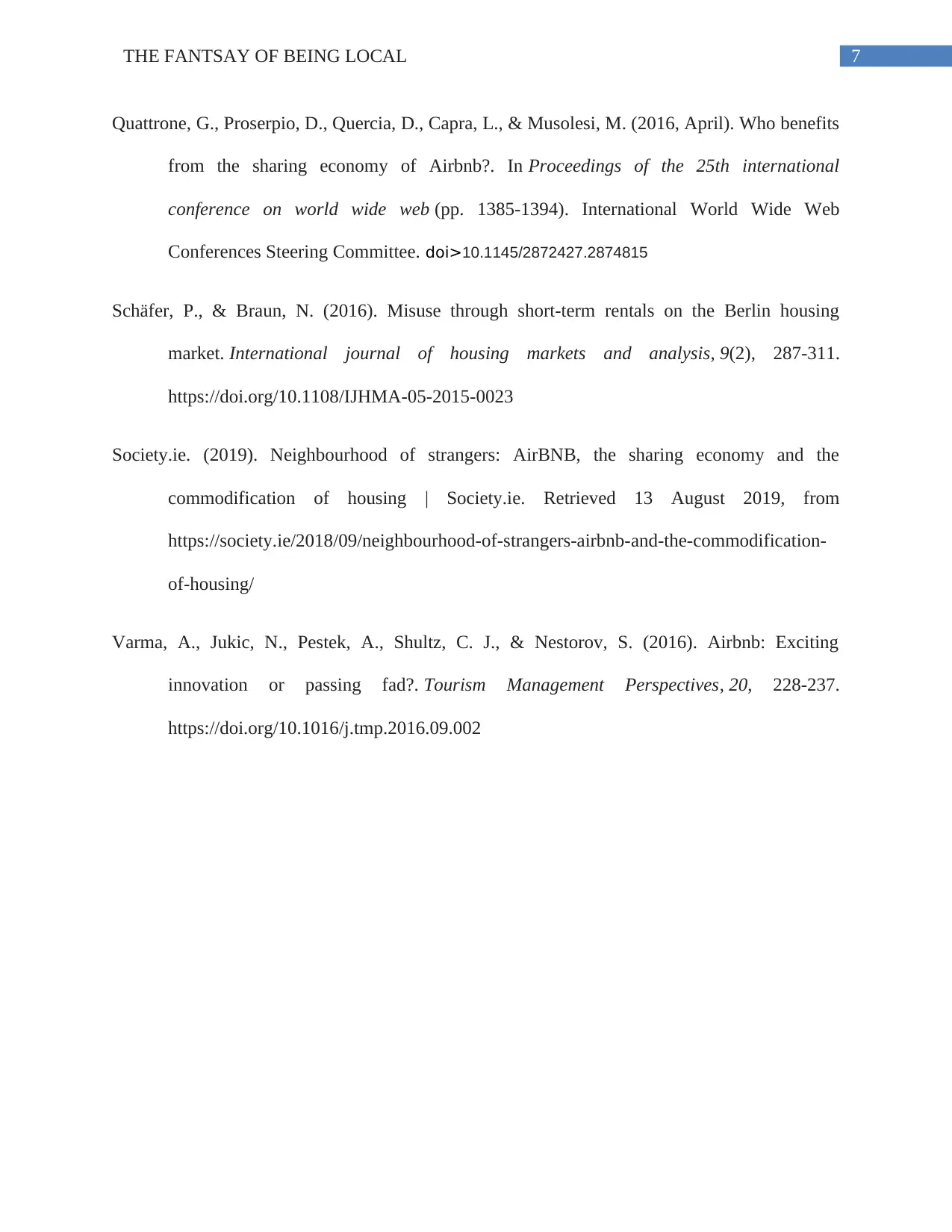
7THE FANTSAY OF BEING LOCAL
Quattrone, G., Proserpio, D., Quercia, D., Capra, L., & Musolesi, M. (2016, April). Who benefits
from the sharing economy of Airbnb?. In Proceedings of the 25th international
conference on world wide web (pp. 1385-1394). International World Wide Web
Conferences Steering Committee. doi>10.1145/2872427.2874815
Schäfer, P., & Braun, N. (2016). Misuse through short-term rentals on the Berlin housing
market. International journal of housing markets and analysis, 9(2), 287-311.
https://doi.org/10.1108/IJHMA-05-2015-0023
Society.ie. (2019). Neighbourhood of strangers: AirBNB, the sharing economy and the
commodification of housing | Society.ie. Retrieved 13 August 2019, from
https://society.ie/2018/09/neighbourhood-of-strangers-airbnb-and-the-commodification-
of-housing/
Varma, A., Jukic, N., Pestek, A., Shultz, C. J., & Nestorov, S. (2016). Airbnb: Exciting
innovation or passing fad?. Tourism Management Perspectives, 20, 228-237.
https://doi.org/10.1016/j.tmp.2016.09.002
Quattrone, G., Proserpio, D., Quercia, D., Capra, L., & Musolesi, M. (2016, April). Who benefits
from the sharing economy of Airbnb?. In Proceedings of the 25th international
conference on world wide web (pp. 1385-1394). International World Wide Web
Conferences Steering Committee. doi>10.1145/2872427.2874815
Schäfer, P., & Braun, N. (2016). Misuse through short-term rentals on the Berlin housing
market. International journal of housing markets and analysis, 9(2), 287-311.
https://doi.org/10.1108/IJHMA-05-2015-0023
Society.ie. (2019). Neighbourhood of strangers: AirBNB, the sharing economy and the
commodification of housing | Society.ie. Retrieved 13 August 2019, from
https://society.ie/2018/09/neighbourhood-of-strangers-airbnb-and-the-commodification-
of-housing/
Varma, A., Jukic, N., Pestek, A., Shultz, C. J., & Nestorov, S. (2016). Airbnb: Exciting
innovation or passing fad?. Tourism Management Perspectives, 20, 228-237.
https://doi.org/10.1016/j.tmp.2016.09.002
1 out of 8
Related Documents
Your All-in-One AI-Powered Toolkit for Academic Success.
+13062052269
info@desklib.com
Available 24*7 on WhatsApp / Email
![[object Object]](/_next/static/media/star-bottom.7253800d.svg)
Unlock your academic potential
Copyright © 2020–2026 A2Z Services. All Rights Reserved. Developed and managed by ZUCOL.





